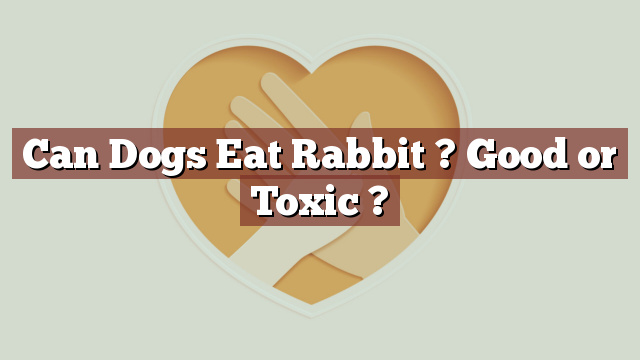Can Dogs Eat Rabbit? Good or Toxic?
When it comes to our furry friends, it is crucial to know which foods are safe for them to consume. One question that often arises is whether dogs can eat rabbit. In this article, we will explore the nutritional value of rabbit for dogs, examine the health benefits and risks of feeding them rabbit meat, discuss potential dangers associated with it, and provide guidance if your dog has accidentally consumed rabbit.
Nutritional Value of Rabbit for Dogs: Vitamins, Minerals, and Protein
Rabbit meat is known for its rich nutritional profile. It is packed with essential vitamins such as B12, B6, and niacin, which are beneficial for a dog’s overall health. Additionally, rabbit meat is a great source of minerals like iron, phosphorus, and zinc, which contribute to the development and maintenance of strong bones and muscles. Furthermore, rabbit meat is a high-quality protein source that aids in the growth and repair of body tissues.
Can Dogs Safely Eat Rabbit Meat? Health Benefits and Risks
Yes, dogs can safely eat rabbit meat. In fact, rabbit is often included as an ingredient in many commercial dog foods due to its numerous health benefits. The lean nature of rabbit meat makes it an excellent choice for dogs with weight management issues or sensitivities to other types of protein. Moreover, rabbit meat is easily digestible, making it suitable for dogs with sensitive stomachs or digestive problems.
It is important to note that while rabbit meat is generally safe for dogs, it should be prepared properly. Avoid seasoning the meat with any spices, as certain seasonings like garlic or onion can be toxic to dogs. Additionally, remove any bones from the meat before serving it to your canine companion, as they can pose a choking hazard or cause intestinal blockage.
Potential Risks: Choking Hazards, Allergies, and Uncooked Meat
While rabbit meat itself is safe for dogs, there are a few potential risks to be aware of. As mentioned earlier, bones can be a choking hazard or cause gastrointestinal issues. Therefore, it is crucial to ensure that the rabbit meat you offer to your dog is bone-free. Additionally, some dogs may have allergies or sensitivities to rabbit meat, just like any other type of protein. If you notice any signs of an allergic reaction, such as itching, vomiting, or diarrhea, discontinue feeding rabbit meat and consult your veterinarian.
Another important consideration is to never feed your dog raw or undercooked rabbit meat. Raw meat can contain bacteria or parasites that can harm your dog’s health. Always cook rabbit meat thoroughly to ensure its safety.
My Dog Ate Rabbit: Signs, Symptoms, and Steps to Take
If your dog has accidentally consumed rabbit, there are a few signs and symptoms to watch out for. These may include vomiting, diarrhea, abdominal pain, or difficulty breathing. If you notice any of these signs, it is essential to contact your veterinarian immediately. They can provide professional advice and guidance based on your dog’s specific situation.
Conclusion: Moderation is Key, Consult Your Vet for Individual Advice
In conclusion, dogs can safely eat rabbit meat. It offers various health benefits, including being a rich source of vitamins, minerals, and protein. However, it is crucial to remove bones, avoid seasoning, and cook the meat thoroughly before feeding it to your dog. As with any new food, it is recommended to introduce rabbit meat gradually and in moderation to monitor your dog’s reaction.
If you have any concerns or questions about feeding rabbit meat to your dog, it is always best to consult your veterinarian. They can provide personalized advice based on your dog’s specific nutritional needs, allergies, or health conditions. Remember, your veterinarian is the best source of information when it comes to the dietary requirements of your beloved canine companion.
Thank you for investing your time in exploring [page_title] on Can-Eat.org. Our goal is to provide readers like you with thorough and reliable information about various dietary topics. Each article, including [page_title], stems from diligent research and a passion for understanding the nuances of our food choices. We believe that knowledge is a vital step towards making informed and healthy decisions. However, while "[page_title]" sheds light on its specific topic, it's crucial to remember that everyone's body reacts differently to foods and dietary changes. What might be beneficial for one person could have different effects on another. Before you consider integrating suggestions or insights from "[page_title]" into your diet, it's always wise to consult with a nutritionist or healthcare professional. Their specialized knowledge ensures that you're making choices best suited to your individual health needs. As you navigate [page_title], be mindful of potential allergies, intolerances, or unique dietary requirements you may have. No singular article can capture the vast diversity of human health, and individualized guidance is invaluable. The content provided in [page_title] serves as a general guide. It is not, by any means, a substitute for personalized medical or nutritional advice. Your health should always be the top priority, and professional guidance is the best path forward. In your journey towards a balanced and nutritious lifestyle, we hope that [page_title] serves as a helpful stepping stone. Remember, informed decisions lead to healthier outcomes. Thank you for trusting Can-Eat.org. Continue exploring, learning, and prioritizing your health. Cheers to a well-informed and healthier future!

